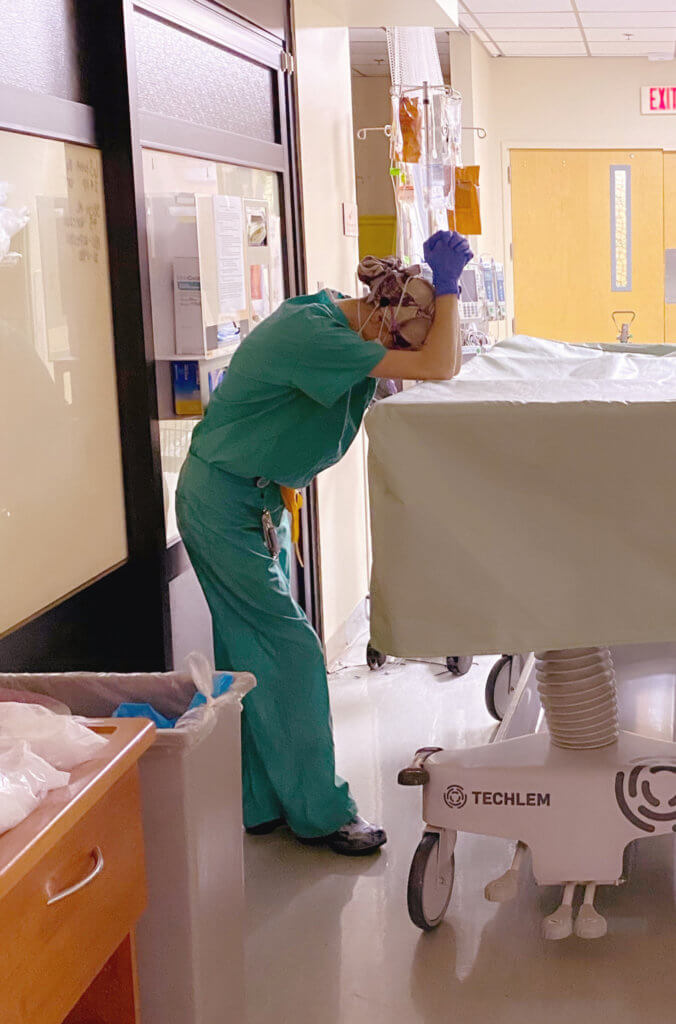State of Emergency: Addressing Mississippi’s Critical Front Line Healthcare Shortage

The Issue
For more than a year, Mississippi nurses and other front line healthcare workers have cared for thousands of those who have battled COVID-19. They have served fearlessly, giving their all to save lives. Exhausted, many have left the state due to a hypercompetitive labor market and extreme demand across the country for the experienced clinical skills needed to care for these patients. Some have abandoned the profession all together.
There are 2,000 FEWER NURSES working in our state than prior to the pandemic (source: Center for Quality and Workforce). Mississippi is one of the unhealthiest states in the nation and it is getting worse. Yet, there is no focus on the ones who can actually make a difference. Mississippi cannot afford to lose one more nurse or caregiver – but without assistance, we will.
Many other professions including environmental services workers and others have struggled also, but no single group has experienced the tumultuous redistribution of labor more than those at the bedside. Community-based safety-net hospitals are simply unable to compete with the salaries offered by large for-profit health systems in other states. Not-for-profit health systems operate on a low to zero margin basis, serving members of the community without the resources to pay for the medical care they need. These health systems have been decimated financially by COVID, with many barely able to make payroll as it is. And without additional funds, there is no source of income to pay the wages that out-of-state entities with better payor demographics are able to pay. We do not have the funds but are asked to fight the fight regardless.
Common Myths
Many believe that hospitals received vast sums of federal money related to the pandemic already. That is incorrect, and the bulk of federal funds received were simply “advance” payments for Medicare charges that are now being paid back to the government. Point blank: there is no hospital windfall from CARES Act Funds. Others believe that treating COVID patients has been profitable for hospitals. This is also a myth. Look at most not-for-profit hospital financial statements: cash balances are down to worrisome levels because of the pandemic, and yet we must use dwindling resources to obtain more nurses now. This predicament will continue into the foreseeable future. As an example, Singing River Health System alone has incurred excess costs of nearly $30 million since the start of the pandemic.
Mississippi Can Respond
The Coronavirus State and Local Fiscal Recovery Funds program authorizes premium pay for nurses and front line healthcare workers. Per federal guidelines related to the intent of these funds, they “are both permitted and encouraged to use Coronavirus State and Local Fiscal Recovery Funds to offer retrospective premium pay, recognizing that many essential workers have not yet received additional compensation for work performed.”
The ASK
Singing River Health System asks you to please urge our State to devote a significant portion of the $1.8 BILLION in American Rescue Plan funds to those front line healthcare workers who can be retained to serve our communities – for their willingness to make a contractual commitment to stay in Mississippi so we can stop the exodus of qualified nurses from our state and bring some back. Just 25% of the $1,800,000,000.00 may be enough to pay almost $20,000 as a retention payment to bedside nurses, respiratory therapists, and other critical caregivers inundated with out-of-state contract offers.
Singing River Health System CEO Lee Bond said:
“We are not asking for this money for hospitals. This ask is directly for the benefit of desperately needed front line healthcare warriors, so that we can retain them and improve health and save lives here in Mississippi.” Mr. Bond went on to say that this funding could be easily administered from a review of the licensing database coupled with employment verification, and distributed over a 24-month retention period pursuant to a simple universal standard agreement. The American Rescue Plan actually encourages this type of use. The economic impact would inure to Mississippi, as these are people that would be living in our state and recirculating these funds into Mississippi’s economy. Such a program would also help Mississippi get people back that have left.
Lee Bond, Chief Executive Officer
No one can blame them for leaving Mississippi to improve their financial position, but we should all be doing our part to reverse this trend. One obvious solution is to use these federal funds as they were intended: to help with the pandemic, and simultaneously to stop the exodus. There is no single better way of improving our future and the health of Mississippians than to allocate a fraction of these funds to those who will continue to make the sacrifice – mentally, physically, and financially – to stay in Mississippi.
Respectfully submitted,
Singing River Health System
August 12, 2021